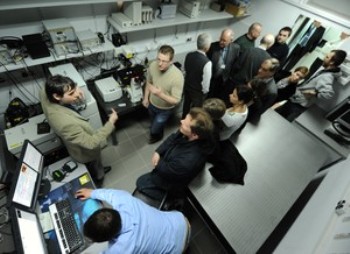A new research laboratory named the Ultrafast Microfluidic Devices Laboratory was opened on March 6, 2012 at the Institute of Physical Chemistry of the Polish Academy of Sciences (IPC PAS) located in Warsaw for visualization of ultrafast micro- and nano-flows.
 A state-of-the-art microfluidics laboratory has opened at the Institute of Physical Chemistry of the Polish Academy of Sciences in Warsaw. (Source: IPC PAS/Grzegorz Krzy¿ewski)
A state-of-the-art microfluidics laboratory has opened at the Institute of Physical Chemistry of the Polish Academy of Sciences in Warsaw. (Source: IPC PAS/Grzegorz Krzy¿ewski)
The newly opened laboratory comes under the IPC PAS’ Department of Physical Chemistry of Soft Condensed Matter and Fluids. It is one among the 14 labs being established under the project called National Multidisciplinary Laboratory of Functional Materials or NanoFun. The NanoBioGeo consortium implements the NanoFun project under the Innovative Economy Operational Programme 2007-2013. The project’s major goal is to launch a network of more than a dozen labs pursuing novel inter- and multi-disciplinary research activities with prospective applications in chemical engineering, biophysics, biochemistry and nanomaterials.
Microfluidics is a potential and growing field of research. Adequate knowledge in microflow phenomena and the technology development for producing, transporting, integrating and partitioning microdroplets of different chemicals is vital for the advancement of the field.
According to Professor Piotr Garstecki, the new lab offers a platform for research activities in phenomena pertaining to microfluidic systems. The primary goal of the lab is to study and record optically ultrafast transport techniques at the nanoscale and microscale, such as diffusion or flows. The advanced equipment at the lab enables to use several microscopic techniques such as bright field and fluorescence microscopies. The equipment enables the lab to perform studies in the field of fluorescence correlation spectroscopy.
The NanoFun consortium’s institutional members and external users, including both local and international, have access to the Ultrafast Microfluidic Devices Laboratory’s equipment.